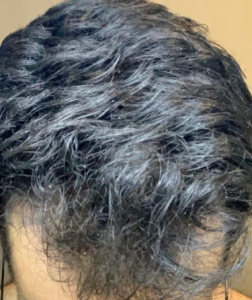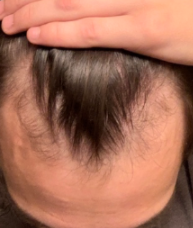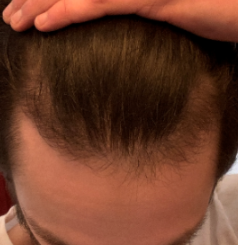Dr. Rassman’s Comments: There is some good reading here for those interested in finasteride and the many finding of things that go wrong with this drug. One of the referenced article reflect a single case study and show DNA damage to sperm. From any single case study, one can’t conclude that the finding is attributed to finasteride as discussed by the authors. Another article address high grade prostate cancer risks with finasteride and found nothing to suggest that it is a cause and effect. Still, these articles are not authoritative and do not stand alone.
This is a follow up from
https://www.reddit.com/r/tressless/comments/f4hnuy/my_trip_to_the_derm/
Once again I am not a medical professional or giving advice.
Basically I’m in my late 20s and have had some thinning and recession, this has gotten worse despite several years of using minoxodil 5% with good compliance. I also use Ketoconazole 2% shampoo (usually daily). I think they both help, but it’s hard to prove.
So I’m looking into propecia/finasteride. I have the pills with a derm. prescribing 5mg stating that the higher dose is more effective than 1 mg.
I saw a urologist the other day about sexual and in particular fertility concerns prior to using finasteride. Honestly the fertility worries me more because I would like to have children down the road but fertility problems aren’t always known until one attempts to conceive. I feel that if one gets noticeable (like erectile dysfunction) side effects, discontinuing the drug is likely to lead to a recovery whereas keeping on the drug for years seems more likely to impair recovery. The Dr. seemed open and candid about side effects overall and discussed both sexual and psychiatric side effects. He stated that the causation of effects was hard to determine given the number of different reported effects and how many things could cause them. He seemed to think that for how often the drug is prescribed side effects aren’t super clear. He stated that fertility effects were “usually” reversible. He also felt that 5mg was too much and referred me to another derm. (who he said takes finasteride himself).
It says right on the finasteride pamphlet that fertility might be effected. I’ve read some studies that have shown a reduction in sperm parameters in some men, typically reversible. This one is probably best https://academic.oup.com/jcem/article/92/5/1659/2598215 , it states that;
” Some individuals (approximately 5% of the subjects on active treatment) demonstrated greater sensitivity to the effects of 5?-reductase inhibition, with decreases in total sperm count to less than 10% of their baseline values during treatment. “
and
“Partial to nearly complete recovery was observed during the follow-up period for total sperm count and semen volume. Of particular note, approximately 5% of individuals on active treatment showed dramatic declines in total sperm count during treatment, although they demonstrated recovery in the follow-up period. The overall impact of these findings on fertility is currently unknown. “
But even that doesn’t tell the whole story. In particular sperm can be visually (by microscope) OK but have damage to the DNA “fragmentation” that causes the cell the either self-destruct “apoptosis” (although I would think this happens early in spermatogenesis), lead to a miscarriages as the human body effectively aborts a fetus with problems, or result in a child carrying/with a mutation. The sperm (or mother through mechanisms I don’t understand well) can sometimes fix the fragmented DNA. I believe this fixing ability deteriorates with age.
DNA fragmentation is associated with older fathers and I believe is why they are associated with offspring with disorders like autism, Down syndrome, and schizophrenia. A high rate of DNA fragmentation is associated with overall difficulty in conceiving and there are at least a couple of case studies of men who discontinued finasteride and had fragmentation levels improve dramatically.
(Articles below)
So, my opinion is that finasteride might effect fertility and this effect is likely reversible. I do feel however that there is a real risk. If I’m one of the 5% with a huge drop in fertility and I take the drug for I dunno 10 years, maybe it’s not so reversible, or some of the less detectable factors don’t fully reverse. It seems odd to me that fertility isn’t a bigger concern with this drug when prescribed to young men.
https://link.springer.com/article/10.1007%2Fs11255-012-0315-9
Herein, we present an unusual case of secondary infertility after prolonged use of low-dose finasteride for androgenetic alopecia in a 40-year-old man. We detected sperm DNA damage in the patient. Despite such a long-term use, we observed that impairment in semen parameters and sperm DNA fragmentation index regressed after the drug was discontinued. Consequently, pregnancy occurred and resulted in live birth.
https://www.ncbi.nlm.nih.gov/pubmed/21292254
To report a case of low-dose finasteride-induced secondary infertility with associated elevated sperm DNA fragmentation index (DFI) and otherwise normal semen parameters.
Case report.
University hospital.
A 48-year-old man on low-dose finasteride and his 37-year-old wife with normal menses and normal gynecologic exam.
Determination of sperm DFI and discontinuation of low-dose finasteride.
Sperm DFI.
The sperm DFI done a year earlier was 30%. This value was unchanged when repeated 2 months later. The patient was advised to stop finasteride. Three months after discontinuing the finasteride, the DFI decreased to 21% and subsequent DFI after another 3 months improved to 16.5%. To date, there is still no documented full-term pregnancy or live birth.
The significant reduction in DFI within 3 months of finasteride cessation and continued improvement suggests a causal link between finasteride and sperm DNA damage. We hypothesize that low-dose finasteride may exert a negative influence on sperm DNA integrity, resulting in increased pregnancy losses. We suggest that in infertile men using finasteride, sperm DFI should be measured in addition to semen parameters, and a trial of discontinuation of finasteride may be warranted.
Copyright © 2011 American Society for Reproductive Medicine. Published by Elsevier Inc. All rights reserved.





